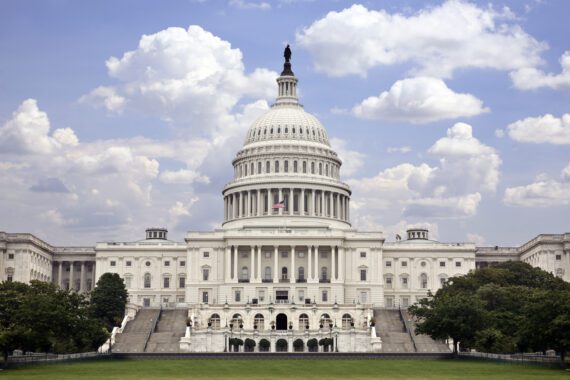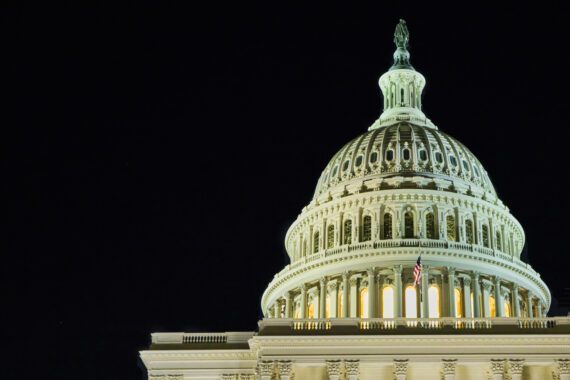In 2022, Bread for the World made striking progress against hunger.
Any success is extraordinary under these circumstances. Because of the pandemic, conflict, climate change impacts, and inflation, the world is moving backwards in its efforts to end hunger, food insecurity, and malnutrition in all its forms.
Our partnerships – with God and each other, in church and in Congress, in the public and private sectors – have made it possible to weather this storm. We were able to pass two major pieces of legislation and, in other ways, increased the political will necessary for future policy change.
Together, we have addressed hunger.
Major Pieces of Legislation on Global Nutrition Passed
President Biden on Oct. 19 signed the Global Malnutrition Prevention and Treatment Act into law. This legislation scales up the prevention and treatment of global malnutrition and brings strategic vision, coordination, effectiveness, and accountability to the U.S. government’s existing global nutrition efforts in a way that supports and partners with local and country-led nutrition strategies.
Because of this legislation, U.S. government aid will better reach women and children with life-saving nutrition interventions.
More than any other legislation on our policy-change agenda or the Congressional calendar, the Global Malnutrition Prevention and Treatment Act exists because of Bread’s unique combination of Washington, DC lobbying, relationships, and coalition-building enacted alongside persistent grassroots/tops advocacy in targeted congressional districts.
In April, Bread for the World secured nearly 180 signatures from Republican and Democrat members of Congress on an internal-to-Congress letter urging the House Appropriations Committee to fund global nutrition at $300 million in FY23 appropriations. The letter urges $1.1 billion for the Maternal and Child Health (MCH) account–which includes $290 million for Gavi, the Vaccine Alliance–and $300 million for the Nutrition Account within the Global Health Programs account at USAID. Adequate funding for the MCH and Nutrition accounts is critical to preserving effective, evidence-based, poverty-focused assistance that saves lives and helps strengthen economies in developing countries.
In July, USAID Administrator Samantha Power announced a U.S. commitment of $200 million to treat children with severe malnutrition. This is the largest single investment in malnutrition treatment in history. The $200 million committed by USAID will provide a critical increase in the amount of RUTF available, allowing UNICEF to reach an additional 2.4 million children suffering from severe wasting in countries with the greatest need in the Horn of Africa and the Sahel region.
Bread for the World’s anti-hunger activists around the country and partners in the Washington, DC policy advocacy community worked together to mobilize activist letters to members of Congress on short notice, published five letters to the editor in local newspapers around the country, joined partner/coalition letters to Congressional leadership, including a joint letter from the U.S. CEO Council for Nutrition; and met with at least 40 Congressional offices in in Washington, DC to advocate for this funding.
Political Will to End Hunger Increased
Bread for the World spent months generating energy ahead of the White House Conference on Hunger, Nutrition, and Health.
More than 400 Bread faith leaders joined a letter to the President calling for the conference. Once it was announced, Bread advocates on college campuses were in discussion with the White House on how food insecurity on college campuses affects them, and Bread members and anti-hunger advocates came to listening sessions to inform recommendations Bread submitted. Bread members penned an op-ed for the IndyStar, the paper serving constituents of two of the co-sponsors of the legislation that funded the White House conference, and staff appeared in the Washington Post, NPR, and Politico, among other outlets.
In October, Bread for the World held the Faithful Voice on Hunger and Climate Convocation at the Desmond Tutu Convention Center in Nairobi, Kenya.
This gathering of global faith leaders from Africa, Europe, and North America was a time for learning and sharing with stakeholders about the importance of sustainable, climate-smart agricultural research, development, and program investment as they relate to nutrition, equity, and the environment. Participants have since shared the faith leaders’ statement that was launched at the Convocation with their spheres of influence at COP27.
Setting a Foundation for the Farm Bill
Bread held more than 25 regional Farm Bill consultations. Data from these consultations joined input from more than 100 meetings with additional stakeholders, including Indigenous farmers and food system leaders, Historically Black Colleges and Universities, U.S. Department of Agriculture officials, local food system leaders (including recipients of U.S. Department of Agriculture grants), and Congressional offices in leadership positions on Senate and House Agriculture committees.
This effort culminated with our Dec. 6, Farm Bill launch event, where the final platform was shared with more than 700 interested advocates who made commitments for action in 2023.
Movement on Anti-Hunger Legislation
On June 24, Congress passed the Keep Kids Fed Act. This is a bipartisan bill that will provide free summer meals for about 30 million kids in America, regardless of income.The bill includes nearly $3 billion to extend all pandemic school meal waivers through the summer and supply chain flexibilities and increased federal reimbursements through the 2022-23 school year. This bipartisan agreement will provide significant help for children who often do not know where they will get their next meal, particularly in communities of color who experience hunger at a disproportionate rate.
The Senate passed the Inflation Reduction Act with key climate provisions in mid-August. The legislation provides $370 billion for climate change and clean energy in a suite of climate-related measures, including $20 billion in support of climate-smart agricultural practices in the United States. Climate change can affect food availability, access, quality, and stability. These are long-term investments in addressing hunger in America. Bread for the World advocated with coalition partners and the Washington, DC, policy advocacy community to influence Congress to support these provisions.
Without your prayer, your advocacy, your financial support, your partnership – more people in our country and the world would be experiencing hunger.
Because you took action, they can be fed.



